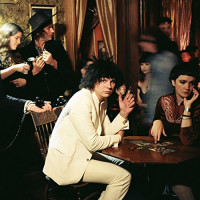
Kyle Craft
Full Circle Nightmare (2018)
ExileOnKingSt
My first encounter with Kyle Craft was about one week after the election in 2016. He was opening for the Drive-by Truckers, and it is no exaggeration that the collective mood in the venue was annihilating depression. Craft didn’t let the somber atmosphere slow down his performance, and he yowled through a set of what I can best describe as honky tonk glam rock. That may seem like an incompatible mixture but damn if he didn’t make it work. He finally got the whole crowd on his side with a solo rendition of a new song called “Before the Wall.” Despite a heavy-handed “Times Are A-Changin” influence (which he prefaced the song with an admission of zero fucks given if we thought it sounded like Dylan), he had the whole auditorium on its feet with a standing ovation at the conclusion. His defiance injected some much-needed vitality into the rest of the evening.
Unfortunately, while Craft’s newest Full Circle Nightmare does not contain anything as overtly political or confrontational as “Before the Wall,” it is a successful expansion of his sound into a Mardi Gras soaked tribute to Sticky Fingers. Nightmare’s predecessor Dolls of Highland was an intoxicating, if occasionally jarring mixture of glam and honky tonk, and the new album triumphantly smooths the rough edges of this musical concoction. Craft tapped Chris Funk of the Decemberists as producer for this new set. Most songs contain a generous amalgam of barroom piano and bustling acoustic guitar rhythms buttressed by fiery electric leads.
Craft’s paradoxical strength and weakness is his tenacious desire to subvert cliché with clever word play that can occasionally straddle the line between ingratiating and endearing. The solitary theme of Nightmare is Craft’s romantic trials at the hands of female provocateurs who simultaneously break his heart and blow his mind. In his frustration at not being the object of a particularly amorous seductress, Craft wonders if she is “a new-age Jezebel dog treat.” Strong, decisive women appear to vex Craft as in “The Rager” he watches the female protagonist “lean in with a low-cut dress … her victims walking out the bar a mess,” and he delights in watching her “court the shadows [as] she swings about the gallows / Rope to rope.” The only weakness with the album is repetitive variance on the motif of fatalistic female foils. Despite the lack of any alternate narrative paths, Craft’s dogged pursuit of inventive word play is buoyed by strong musical performances and an enjoyable sonic palette of the Stones hung over on Bourbon Street.